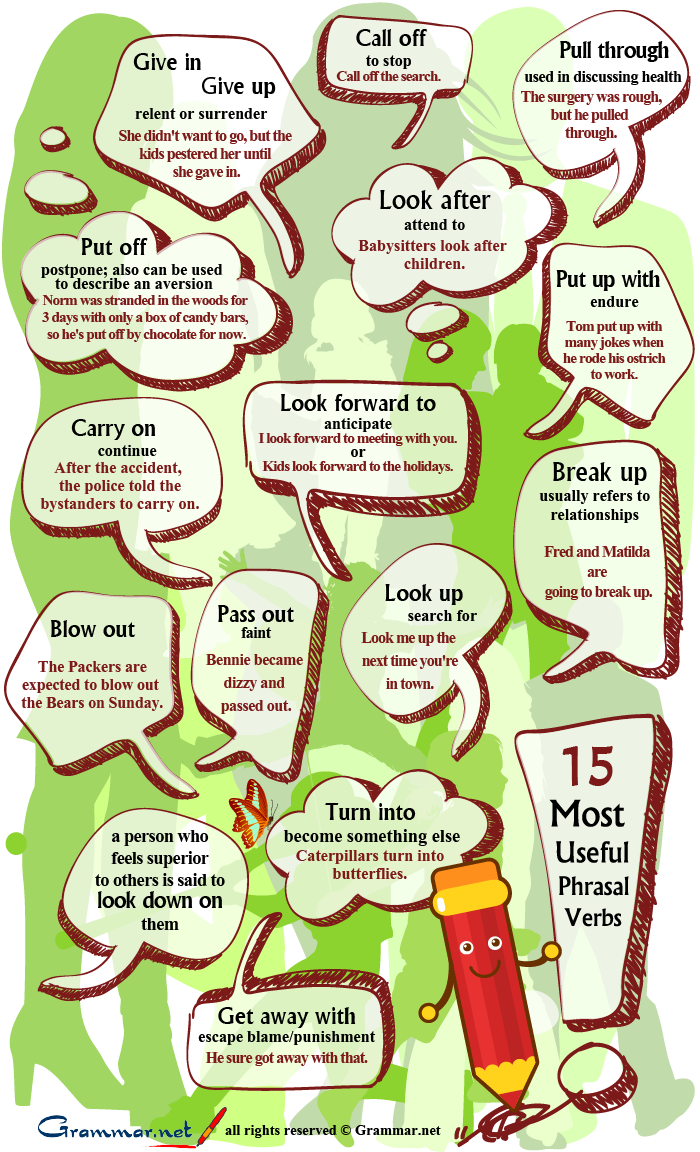Useful phrasal verbs in English Posted by Gabriele on Feb 17, 2015 in English Grammar, English Language
Here are some things you should know about phrasal verbs in English before we go any further:
- Some phrasal verbs are intransitive (intransitive verb cannot be followed by an object) and some are transitive (transitive verbs can be followed by an object).
- Some transitive phrasal verbs are separable (this means the object is placed between the verb and the preposition) and some are inseparable (this means the object is placed after the preposition).
So, what do you think about phrasal verbs so far? You are probably thinking, well, they are just like everything else when it comes to English grammar – there are no rules! Okay, that is a bit of an exaggeration, there are some rules, but phrasal verbs like to play around with the rules a lot! This is why many people find using phrasal verbs difficult. I want to help with that some today, but to do so we are going to have to think about phrasal verbs differently.
Here is how I recommend you think about phrasal verbs in English: Remember, phrasal verbs are (mostly) two-word phrases. They are made up a verb + adverb or a verb + preposition. When you are learning phrasal verbs, it is best to think of them as a unit, not separate parts. Think of each phrasal verb as though it is its own vocabulary word. Try to learn that vocabulary word in context, don’t just memorize it from a list. The infographic from Grammar.net above does a nice job of helping you do this. For example, it gives you a phrasal verb (“look after”), the meaning of the phrasal verb (“attend to”), and presents the phrasal verb in context (“Babysitters look after children.”).
This infographic has a nice starter list of ‘The 15 Most Useful Phrasal Verbs’ in English, according to Grammar.net. I have 15 more useful phrasal verbs I want to share with you too. Take a look at all 30 of these phrasal verbs and pick 5 you want to use in the next week. Then work on becoming familiar with and using them. The following week come back to this post again and pick 5 more phrasal verbs to work on for the next week. This is a great way to work on building your vocabulary a little at a time.
ask (someone) out – to invite (someone) on a date
Example: After working up the courage all day, Jenny asked Bill out.
bring (something) up – to start talking about something
Example: My mother and aunt always bring marriage up when my boyfriend and I are around.
cheer up – to make someone happier
Example: Paul needed to be cheered up after hearing he did not get the job he really wanted.
drop out – to quit or stop attending a class/school
Example: Sometimes when I am frustrated with school I just want to drop out.
end up – to reach a decision (or take an action) after thinking about it for a while
Example: We ended up moving to Oregon, but it took us a long time to finally make the move.
fill out – to write information in where it is missing, such as on a form
Example: The form must be filled out completely before it is turned in.
get together – to meet with people
Example: We all decided to get together at James’ house before the party.
look over – to check something for mistakes
Example: The teacher told everyone to look over their tests before turning them in to be graded.
make up – to forgive someone (or one another)
Example: After a year of fighting the sisters finally made up when their mother became sick.
run out – to have none left, for something to be empty
Example: The restaurant usually runs out of their desserts early.
shop around – to compare prices
Example: It is best to shop around before buying a new car.
try (something) out – to test, usually for the first time
Example: Harry is going to try my new recipe out tonight.
use up – to finish the entire amount of something
Example: We have used up all the time we have on the meter, so we need to move the car or put in more money.
work out – to exercise
Example: I work out at the gym from 10-11am everyday.
work out – to successfully complete something
Example: When our plan finally worked out we all cheered.

Build vocabulary, practice pronunciation, and more with Transparent Language Online. Available anytime, anywhere, on any device.
About the Author: Gabriele
Hi there! I am one of Transparent Language's ESL bloggers. I am a 32-year-old native English speaker who was born and raised in the United States. I am living in Washington, DC now, but I have lived all over the US and also spent many years living and working abroad. I started teaching English as a second language in 2005 after completing a Master's in Applied Linguists and a Certificate in English Language Teaching to Adults' (CELTA). Since that time I have taught ESL in the United States at the community college and university level. I have also gone on to pursue my doctorate in psychology and now I also teach courses in psychology. I like to stay connected to ESL learners around the world through Transparent Languages ESL Blog. Please ask questions and leave comments on the blog and I will be sure to answer them.




